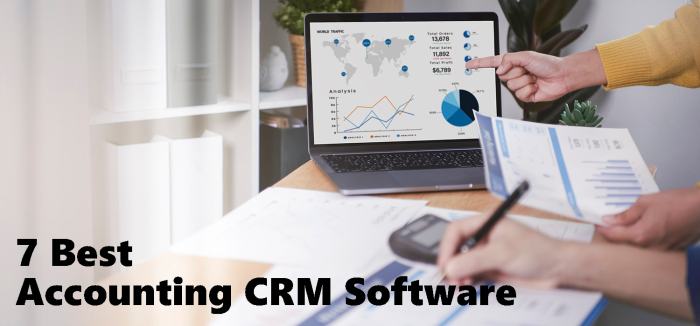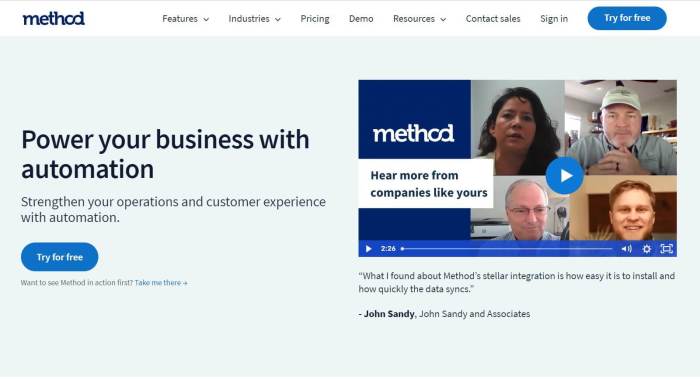Crm software for accountants – In today’s competitive landscape, accounting firms need more than just proficiency in numbers; they need efficient systems to manage client relationships, track projects, and boost overall productivity. This is where Customer Relationship Management (CRM) software steps in. A well-chosen CRM can transform your accounting practice, improving client satisfaction, increasing profitability, and freeing up valuable time for strategic initiatives.
This comprehensive guide explores the benefits, features, and considerations for selecting the right CRM software for your accounting firm.
Understanding the Benefits of CRM for Accountants
Implementing a CRM system offers numerous advantages for accounting professionals, impacting various aspects of your business. These benefits extend beyond simple contact management, offering a holistic approach to client relationship management.
Improved Client Communication and Engagement, Crm software for accountants
A centralized CRM system provides a single source of truth for all client interactions. This means no more searching through scattered emails, spreadsheets, or notes. With a CRM, you can easily access complete client histories, including past interactions, projects, and financial details. This facilitates more personalized and efficient communication, leading to stronger client relationships and improved retention rates.
Features like automated email sequences and appointment scheduling further enhance client engagement.
Enhanced Project Management and Workflow Efficiency
Many CRMs offer robust project management capabilities, allowing you to track deadlines, assign tasks, and monitor progress on client projects. This streamlines workflows, improves team collaboration, and reduces the risk of missed deadlines or overlooked tasks. Features like task automation and progress tracking ensure projects stay on schedule and within budget.
Increased Team Collaboration and Productivity
CRMs foster seamless collaboration among team members. Shared access to client information and project details eliminates information silos and ensures everyone is on the same page. This leads to increased efficiency, reduced errors, and improved overall team productivity. Features like shared calendars and team communication tools further enhance collaboration.
Data-Driven Insights for Strategic Decision-Making
CRM systems gather valuable data on client interactions, project performance, and business operations. This data can be analyzed to identify trends, improve processes, and make informed strategic decisions. Reporting and analytics dashboards provide valuable insights into key performance indicators (KPIs), enabling you to track progress, identify areas for improvement, and optimize your business strategies.
Improved Client Onboarding and Retention
A CRM can streamline the client onboarding process, ensuring a smooth and efficient transition for new clients. Automated workflows, standardized processes, and readily available information minimize manual tasks and ensure a consistent client experience. Furthermore, proactive engagement and personalized communication, facilitated by the CRM, contribute significantly to improved client retention.
Key Features to Look for in Accounting CRM Software
When choosing a CRM for your accounting practice, consider these essential features:
Client Management Capabilities
The core function of any CRM is client management. Look for a system that allows you to store comprehensive client information, including contact details, financial data, communication history, and relevant documents. Advanced features like custom fields and segmentation allow for tailored client management.

Source: cloudinary.com
Contact Management and Communication Tools
Effective communication is vital. The CRM should integrate seamlessly with your email, calendar, and other communication tools. Features like automated email marketing, appointment scheduling, and integrated messaging platforms can significantly improve communication efficiency.
Document Management and Storage
Securely store and access all client-related documents within the CRM. This eliminates the need for searching through physical files or multiple folders. Look for features like version control and secure file sharing.
Financial Management Integration
Ideally, your CRM should integrate with your accounting software. This allows for seamless data transfer and eliminates manual data entry, reducing errors and saving time. Features like automated invoice generation and payment tracking are valuable additions.
Reporting and Analytics
The ability to generate reports and analyze data is crucial for making informed business decisions. Look for a CRM with customizable dashboards and reporting tools that provide insights into key metrics like client acquisition cost, customer lifetime value, and project profitability.
Security and Data Privacy
Data security is paramount, especially when dealing with sensitive client information. Ensure the CRM provider adheres to strict security protocols and complies with relevant data privacy regulations such as GDPR and CCPA. Look for features like data encryption, access controls, and regular security audits.
Scalability and Customization
Choose a CRM that can grow with your business. It should be scalable to accommodate increasing numbers of clients and users. Customization options allow you to tailor the system to your specific needs and workflows.
Top CRM Software Options for Accountants
Several excellent CRM options cater specifically to the needs of accounting firms. Researching and comparing different platforms is crucial to finding the best fit for your practice. Some popular choices include:
- Xero: A popular cloud-based accounting software with integrated CRM features.
- QuickBooks Online: Another leading cloud-based accounting software with CRM capabilities.
- Zoho CRM: A comprehensive CRM platform with robust features and integrations.
- Salesforce: A highly customizable and scalable CRM platform suitable for larger accounting firms.
- HubSpot CRM: A free and user-friendly CRM option with excellent marketing automation features.
Note: This is not an exhaustive list, and the best CRM for your firm will depend on your specific needs and budget.
Frequently Asked Questions (FAQ): Crm Software For Accountants
- Q: What is the cost of CRM software for accountants? A: The cost varies widely depending on the features, scalability, and provider. Some offer free plans with limited features, while others have tiered pricing based on the number of users and functionalities.
- Q: How long does it take to implement a CRM system? A: Implementation time depends on the complexity of the system and your firm’s size. It can range from a few weeks to several months.
- Q: Does CRM software integrate with my existing accounting software? A: Many CRMs offer integrations with popular accounting software packages. Check for compatibility before selecting a system.
- Q: What training is required to use CRM software? A: Most CRM providers offer training resources, including tutorials, documentation, and webinars. The learning curve varies depending on the system’s complexity.
- Q: How can I measure the ROI of a CRM system? A: Track key metrics like client retention rates, project completion times, and overall team productivity. Compare these metrics before and after implementing the CRM to assess the return on investment.
Choosing the Right CRM: A Strategic Investment
Selecting the right CRM software is a strategic investment that can significantly impact your accounting firm’s success. By carefully considering your needs, researching available options, and implementing the system effectively, you can unlock numerous benefits, including improved client relationships, enhanced efficiency, and increased profitability. Don’t hesitate to leverage the power of CRM to streamline your operations and propel your accounting practice to new heights.
Call to Action (CTA)
Ready to transform your accounting practice? Explore the CRM options mentioned above and contact a provider today for a consultation. Take the first step towards a more efficient, profitable, and client-centric future.
Questions Often Asked
What types of CRM software are best suited for accountants?
Cloud-based CRMs are generally preferred for their accessibility and scalability. Look for features specifically designed for accounting practices, such as integration with accounting software and client portal capabilities.

Source: contentmavericks.com
How much does CRM software for accountants cost?
Pricing varies widely depending on the features, number of users, and vendor. Expect to find options ranging from affordable monthly subscriptions to more expensive enterprise solutions.
What are the key features to look for in an accounting CRM?
Essential features include client relationship management, contact management, task management, document storage, reporting and analytics, and ideally, integration with existing accounting software.
How long does it take to implement CRM software?
Implementation time depends on the complexity of the system and the size of the firm. Expect a period of training and data migration, potentially lasting from a few weeks to several months.
